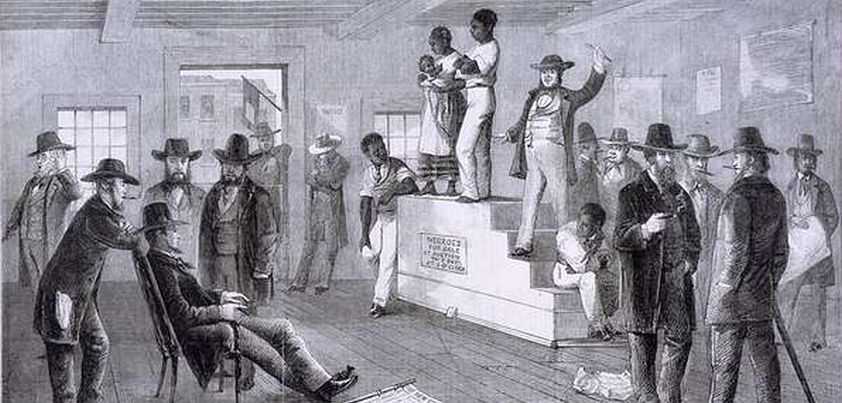 This Langston Hughes story introduces an often-overlooked element of the American racial debate. A community committee reverses a decision to award an arts scholarship to a promising high-school senior when they learn that she is colored. Her art teacher, who is of Irish descent, describes the discrimination and violence suffered by her people when they first arrived in the country. Although the girl didn’t win the award, she emerges from the experience stronger and even more determined to succeed. Themes: equality, the American Dream (defined in the story as liberty and justice for all), racial discrimination, injustice, resilience, determination, hope. More…
This Langston Hughes story introduces an often-overlooked element of the American racial debate. A community committee reverses a decision to award an arts scholarship to a promising high-school senior when they learn that she is colored. Her art teacher, who is of Irish descent, describes the discrimination and violence suffered by her people when they first arrived in the country. Although the girl didn’t win the award, she emerges from the experience stronger and even more determined to succeed. Themes: equality, the American Dream (defined in the story as liberty and justice for all), racial discrimination, injustice, resilience, determination, hope. More…
Archives
The Blues I’m Playing
 This story from Langston Hughes contrasts two women with very different outlooks on life. A wealthy, white, middle-aged widow finds purpose and intimacy through the patronization of young artists. Tensions emerge when the woman, who expects her protégés to behave in a manner consistent with her high social standing, takes on a black pianist for the first time. The talented, independent, working class young woman has her own ideas on life, love, and the music she wants to play. Themes: art, paternalism vs. independence, race and racism, sexuality, the significance and transforming power of music. More…
This story from Langston Hughes contrasts two women with very different outlooks on life. A wealthy, white, middle-aged widow finds purpose and intimacy through the patronization of young artists. Tensions emerge when the woman, who expects her protégés to behave in a manner consistent with her high social standing, takes on a black pianist for the first time. The talented, independent, working class young woman has her own ideas on life, love, and the music she wants to play. Themes: art, paternalism vs. independence, race and racism, sexuality, the significance and transforming power of music. More…
Slave on the Block
 This early Langston Hughes story satirizes attitudes toward African American music and culture during the Harlem Renaissance. A wealthy, artistic couple seek to improve their social status through paintings and music inspired by their African American servants. Although superficially respectful of the servant’s African heritage, they privately exhibit a condescending tone towards these natural, childlike people who should be left unspoiled and simply enjoyed. A young negro, fresh from the south, learns to manipulate the patronizing couple before orchestrating a metaphorical bid for “freedom”. Themes: freedom vs. slavery, the beauty of black music and art, moral superiority, suppressed desire, racism. More…
This early Langston Hughes story satirizes attitudes toward African American music and culture during the Harlem Renaissance. A wealthy, artistic couple seek to improve their social status through paintings and music inspired by their African American servants. Although superficially respectful of the servant’s African heritage, they privately exhibit a condescending tone towards these natural, childlike people who should be left unspoiled and simply enjoyed. A young negro, fresh from the south, learns to manipulate the patronizing couple before orchestrating a metaphorical bid for “freedom”. Themes: freedom vs. slavery, the beauty of black music and art, moral superiority, suppressed desire, racism. More…
Thank You, M’am
 This 1950s story from Langston Hughes has messages for both young and old. A teenage thief (Roger) learns that in addition to it being wrong to try to get things “the easy way”, sometimes the person you target is a kindly soul who can ill afford it. Mrs Jones knows what it is like to grow up poor. Instead of handing Roger over to the police, she tries to help him. Sadly, one suspects that her actions (taking the lad home for a meal and friendly chat) would not be safe in today’s world. Themes: crime, forgiveness, understanding, trust, kindness. More…
This 1950s story from Langston Hughes has messages for both young and old. A teenage thief (Roger) learns that in addition to it being wrong to try to get things “the easy way”, sometimes the person you target is a kindly soul who can ill afford it. Mrs Jones knows what it is like to grow up poor. Instead of handing Roger over to the police, she tries to help him. Sadly, one suspects that her actions (taking the lad home for a meal and friendly chat) would not be safe in today’s world. Themes: crime, forgiveness, understanding, trust, kindness. More…